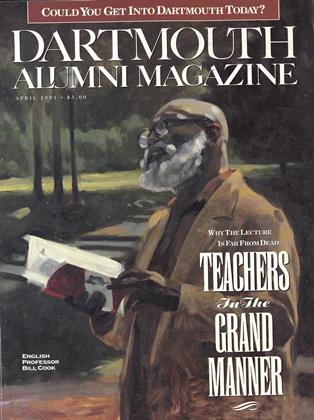Admissions expert Howard Greene '59 gives the current odds of making
Old grads of dartmouth (those who got their diplomas prior to 1980) often think that if pitted against the new crop of super-candidates they probably would not be included in the class of 1995. The fact that the College now rejects four out of five applicants (compared to the 19305, when half of all applicants were accepted) makes pretty convincing evidence for the lament, "I wouldn't make it today."
Instead of feeling down, however, why not take the position that you might well be offered admission today by doing the things in secondary school that would make you a strong candidate? The real question is not one of odds but of preparation. Long study of selective admissions leads me to believe that there is a tendency to forget just how seriously we readied ourselves for admission in our own Many of us can recall enrolling in special classes or taking practice college boards. Alumni of my era, who were less likely to take the boards, took the trouble to visit Dartmouth and learn what was expected if we were were to compete with the favored prep-school crowd. At these visits, admissions officers told us that in addition to a ranking in the top ten percent of our class, a strong extracurricular record would count heavily in our favor. Entering classes, we were told, boasted of a legion of football captains, hordes of editors of school publications, a company of dramatic club presidents, and so forth.
Although Dartmouth has been a selective school since 1920, the institution's selection policies have changed over the years. Applicants in my era knew we stood a 50-50 chance of being rejected. We also knew that as many as 20 percent of the freshman class might not make it through. Today only two or three percent of those enrolled fail to complete their undergraduate requirements for academic reasons; the College has stopped admitting academically marginal students. The emergence of the meritocratic philosophy and the Civil Rights movement in the sixties made the large percentage of Ivy applicants admitted from prep schools an anathema. As a result, admissions officers deliberately accepted more high school graduates and minority applicants. The two-toone ratio favoring prep school grads eventually reversed in favor of high school graduates.
Admissions criteria have also changed. Thirty years ago, the wellrounded student with a strong academic record had a good shot at being admitted. Today, Dartmouth seeks applicants who focus their non-academic pursuits. Spreading your energies in secondary school is fatal; today less is more. Applicants to Dartmouth must produce an extracurricular resume carrying the message: I EXCELLED.
A top applicant must also be able to convey that message on the application form. Among top schools, Dartmouth's application is one of the toughest to complete. Harvard, for example, asks applicants to answer one of four questions in a 250-word essay. Dartmouth applicants, by contrast, have to write two essays—one of which asks the applicant to compose "a thought-provoking and revealing question of college applicants" and then to answer it. In this arena of competition, older alumni probably have the upper hand—it is generally conceded that they had stronger writing skills than today's applicants. I know if I were applying for admission today I would submit word-for-word the essay I submitted in 1955.
Although the changes I've outlined don't necessarily make admission to Dartmouth harder than in the past, they demonstrate that an awareness of admissions strategies is more important now than when there were fewer subgroups under consideration. For example, enrolling in your local high school, rather than a prep school, may actually increase your chances, because you may be competing against fewer applicants from that school. On the other hand, being a legacy is still a plus. Alumni children, composing about 16 percent of an average class, still have about a 50 percent chance of being admitted.
So before you say, "I'd never make it today," ask yourself three questions:
• Would I rank in the upper five to ten percent in my class in secondary school?
• Would I stand out as a strong athlete, a class leader, a talent, an extracurricular star, or community-service leader (a new possibility for achievement)?
• Would I really desire to go to one of the most demanding, selective colleges, or would I settle for a place where the competitive pressure is lower?
I suspect that a majority of those with a Dartmouth A.B. will find they are still strong applicants, just as they were in "the good old days" when "it was easier to get in."
???
 View Full Issue
View Full Issue
More From This Issue
-
 Cover Story
Cover StoryTeachers in the Grand Manner
April 1991 By DEBORAH SCHUPACK '84 -
 Feature
FeatureA Recent Interview with Ernest Martin Hopkins' 01
April 1991 -
 Feature
FeatureHer Friend the Dalai Lama
April 1991 By Peter Bien -
 Feature
FeatureSTEVE KELLEY IN TWO ACTS
April 1991 By ROBERT ESHMAN '82 -
 Feature
FeatureDisengagement
April 1991 By John Sloan Dickey '29 -
 Article
ArticleDR. WHEELOCK'S JOURNAL
April 1991 By E. Wheelock
Features
-
 Cover Story
Cover StoryTed Wolf '30
March 1993 -
 Feature
FeatureNoble Boots
JUNE 1996 By Chris Clarke ’75 -
 Feature
FeatureShoot to Thrill
Jul/Aug 2004 By DAVID MCKAY WILSON -
 Cover Story
Cover StoryThe Dartmouth Disease
SEPTEMBER 1983 By George O'Connell -
 Feature
FeatureThe Valedictories
July 1974 By LAN R. LAW '74, John G. Kemeny -
 FEATURES
FEATURESThe Buckaroo Effect
JANUARY | FEBRUARY 2024 By TY BURR '80



